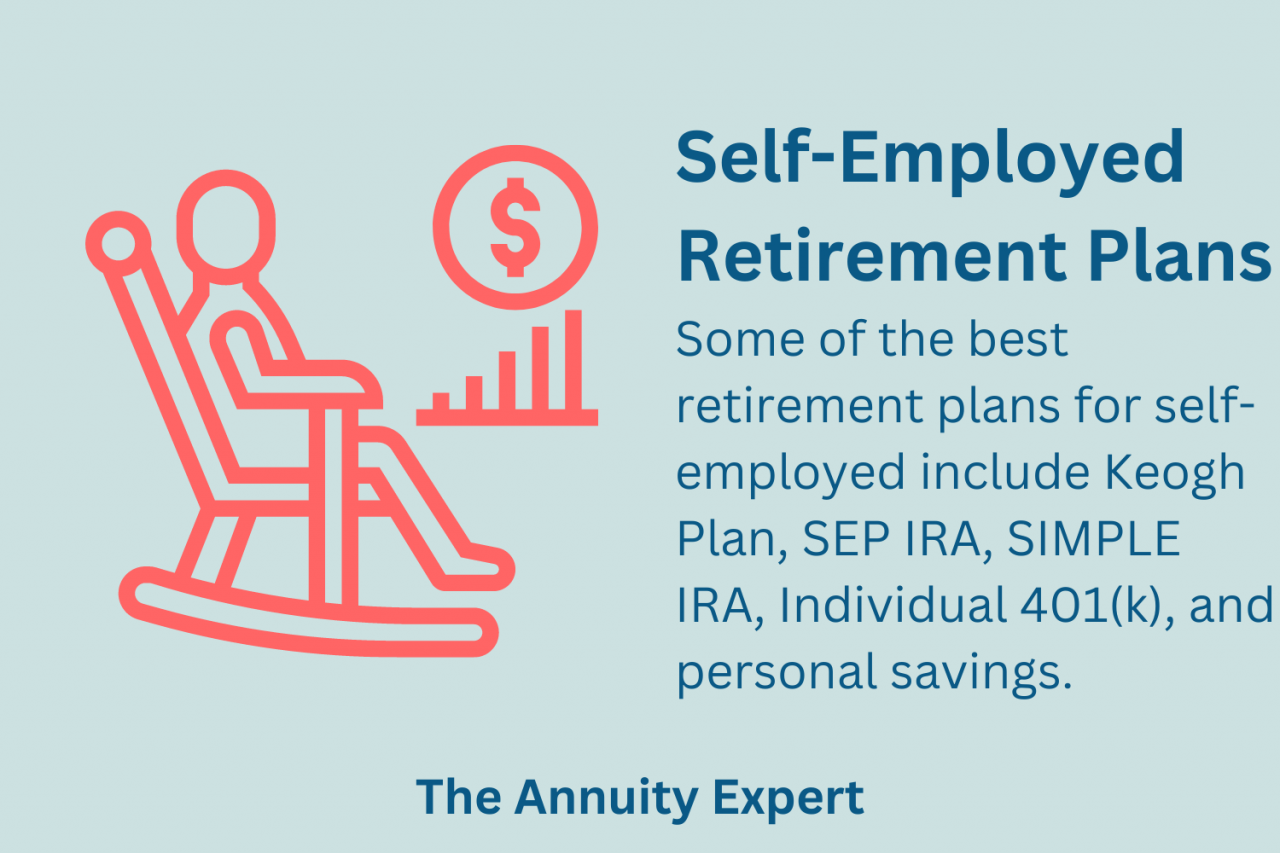A retirement plan offered for the self-employers is a/an – In the ever-evolving landscape of retirement planning, a retirement plan offered for the self-employed takes center stage as a beacon of financial security. For those who chart their own entrepreneurial course, this guide will illuminate the intricacies of retirement planning, empowering you to navigate the unique challenges and unlock the path to a secure financial future.
Understanding the types of retirement plans available, the contribution limits and tax benefits, and the investment options within these plans is crucial. This comprehensive guide will provide you with the knowledge and strategies you need to maximize your retirement savings and ensure a comfortable retirement.
A retirement plan offered for the self-employed is a/an, well, it’s a plan that can help you save for your future. And if you’re looking for ways to improve your employee compensation plan, check out these 8 components of an effective employee compensation plan . They can help you attract and retain top talent.
Back to retirement plans for the self-employed, they are a great way to ensure you have a comfortable retirement.
Definition of a Retirement Plan for Self-Employed Individuals
A retirement plan for self-employed individuals is a specialized financial tool designed to help those who work for themselves save for their future financial security. Self-employed individuals face unique financial challenges, such as irregular income, lack of employer-sponsored retirement benefits, and high healthcare costs.
Yo, check it! If you’re self-employed and trying to save for the golden years, a retirement plan is your go-to. But did you know that just like an effective lesson plan has 7 key components , a solid retirement plan also needs a few essentials to keep your future lookin’ bright.
A retirement plan can address these challenges by providing tax-advantaged savings and investment options.
A retirement plan offered for the self-employers is a/an SEP IRA, and if you don’t have one, then you need to take a page from big business and design a disaster recovery plan, like AWS . Because when the server crashes, you need a way to get back up and running quickly and efficiently.
And just like a retirement plan, a disaster recovery plan is essential for protecting your business.
Types of Retirement Plans for Self-Employed Individuals

There are several types of retirement plans available to self-employed individuals, each with its own features, benefits, and limitations. Some common options include:
- SEP IRA (Simplified Employee Pension Individual Retirement Account)
- SIMPLE IRA (Savings Incentive Match Plan for Employees)
- 401(k) plan
- Solo 401(k) plan
Contribution Limits and Tax Benefits: A Retirement Plan Offered For The Self-employers Is A/an
Retirement plans for self-employed individuals offer significant contribution limits and tax benefits. The limits vary depending on the type of plan, but they typically allow for higher contributions than traditional IRAs. Additionally, contributions to these plans are tax-deductible, which can reduce current income taxes and increase retirement savings.
Investment Options within Retirement Plans
Retirement plans for self-employed individuals offer a wide range of investment options, including stocks, bonds, mutual funds, and ETFs. It is important to diversify investments to manage risk and maximize potential returns. Choosing appropriate investment strategies should be based on individual goals, risk tolerance, and time horizon.
Yo, if you’re self-employed, a retirement plan is like a financial roadmap that keeps you on track. It’s similar to a budget, an informal plan for future business activities , but instead of mapping out your spending, it helps you plan for your golden years.
Just like a budget keeps you on top of your expenses, a retirement plan ensures you have a sweet nest egg when it’s time to hang up your work boots.
Withdrawal Rules and Tax Implications
There are specific rules and tax implications associated with withdrawing funds from retirement plans for self-employed individuals. Withdrawals made before age 59½ may be subject to a 10% early withdrawal penalty. Additionally, withdrawals are taxed as ordinary income. It is important to understand these rules to minimize taxes and avoid penalties when accessing retirement funds.
A retirement plan offered for the self-employed is a/an estate plan . Unmarried couples, in particular, need an estate plan to ensure that their wishes are respected and their assets are distributed according to their intentions. An estate plan can also help to avoid probate, which can be a lengthy and expensive process.
A retirement plan offered for the self-employed is a/an important part of any financial plan.
Comparison with Employer-Sponsored Retirement Plans

Retirement plans for self-employed individuals differ from employer-sponsored retirement plans in several ways. Employer-sponsored plans typically offer higher contribution limits and more investment options. However, self-employed individuals have more control over their plan and can choose the investment options that best suit their needs.
Conclusion
As you embark on this journey of retirement planning, remember that knowledge is your most valuable asset. By arming yourself with the information provided in this guide, you can make informed decisions that will shape your financial future. Embrace the opportunities that self-employment offers, and let this guide be your compass as you navigate the path to retirement security.
Answers to Common Questions
What are the key features of a retirement plan for the self-employed?
Retirement plans for the self-employed offer unique features such as tax-deductible contributions, investment options, and the ability to contribute both as an employee and an employer.
How do I choose the right type of retirement plan for my needs?
Consider factors such as your income, age, risk tolerance, and investment goals when selecting a retirement plan. Different plans have varying contribution limits and tax implications, so it’s important to choose the one that aligns with your specific circumstances.
What are the tax benefits of contributing to a retirement plan for the self-employed?
Contributions to retirement plans for the self-employed are often tax-deductible, reducing your current tax liability. Additionally, earnings within the plan grow tax-deferred, further boosting your retirement savings.